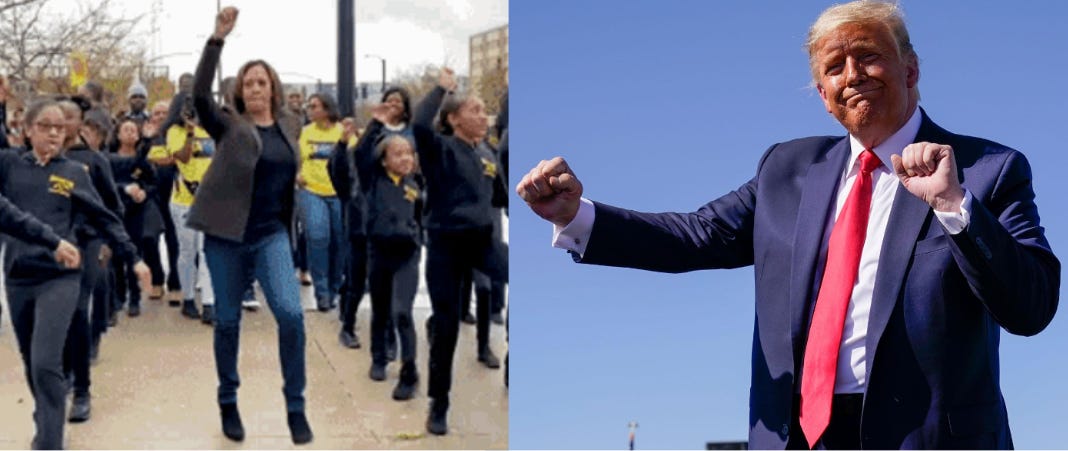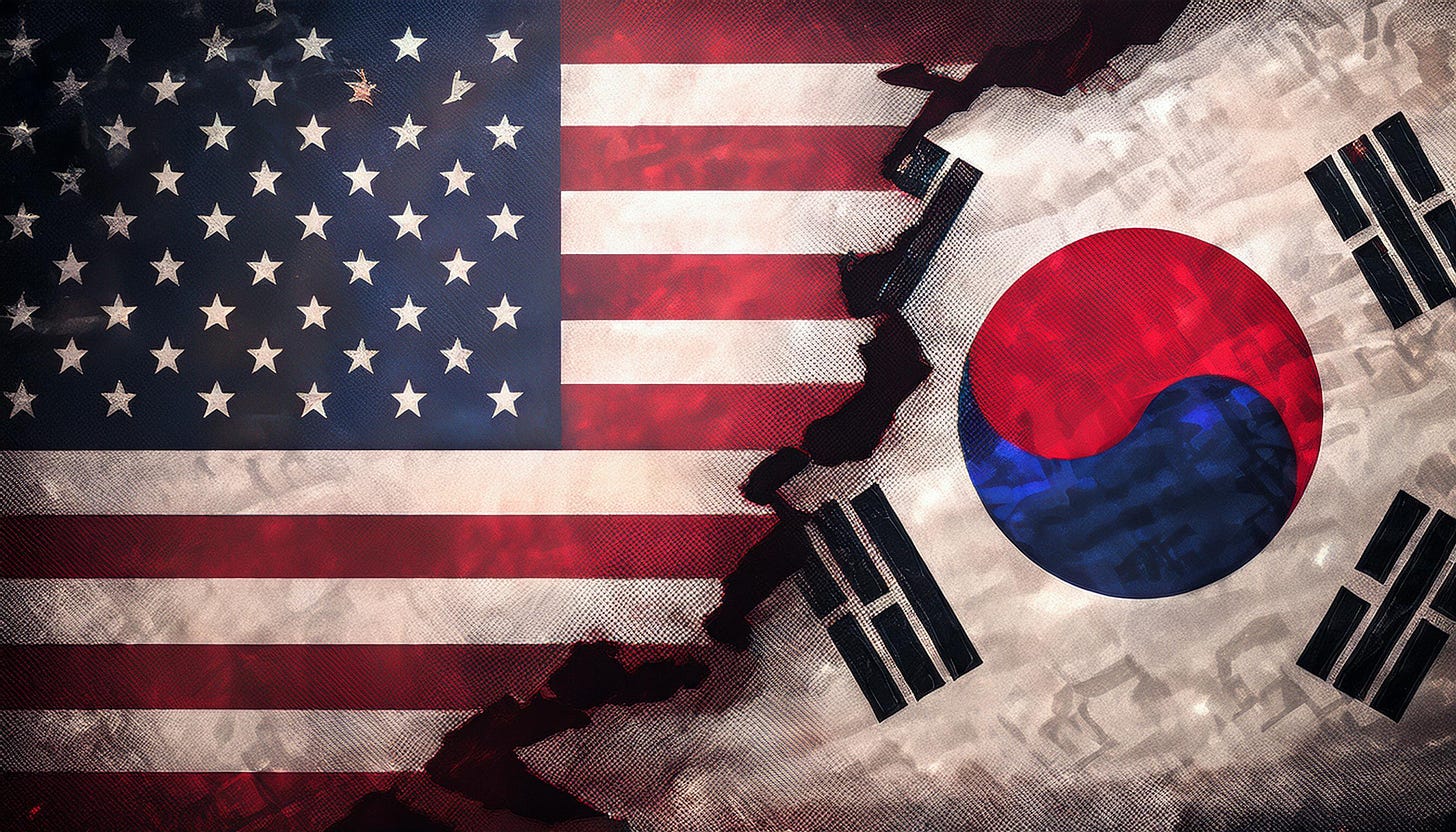Dancing in-sync or solo? South Korea’s reaction to Harris and Trump
Like financial markets, foreign policy expectations shape outcomes before events unfold. The damage has already been done.
In the coming days, there will be A LOT of articles with commentators giving their advice on what a Harris or Trump Administration would mean for South Korea. It’s a tempting article to write - speculative, easy to spin, and full of news-ready clickbait. However, such articles neglect the fact that South Korea has already factored in the risks and rewards of both a Harris and Trump Administration. To be blunt, the damage has already been done.
In foreign policy, much like in financial markets, expectations shape outcomes before events unfold. Just as markets respond to anticipated changes—whether it’s a central bank's interest rate decision or a major corporation's earnings report—countries adjust their policies and strategies based on what they believe will happen. This concept of "expectation management" plays a crucial role in how states navigate the complex web of global politics.
For instance, when a country anticipates a shift in US foreign policy following an election, it proactively adjusts its diplomatic posture, military preparedness, or economic policies to align with the expected changes. Similarly, the mere possibility of an international conflict can lead nations to fortify alliances, increase defense spending, or engage in preemptive negotiations, all in anticipation of what might happen. This is particularly true when the anticipated outcome is high probability, high impact, or both.
This phenomenon is evident in the behavior of major powers, middle powers and smaller states alike, as they seek to hedge against uncertainties and position themselves advantageously. All states have long been doing this in anticipation of the US election given both prior experience and expectations as Biden’s chances of reelection declined. South Korea, because of its more precarious geostrategic environment, has been preparing even longer than other states.
In-sync with Biden (and Harris): Institutionalization and militarization?
South Korea has actively prepared for the possibility of a second Biden term (or its like replacement in the more electable Harris), anticipating continuity in US foreign policy and seeking to strengthen the US-South Korea alliance. Recognizing the Biden administration’s emphasis on US-led multilateralism, democratic values, and the Indo-Pacific strategy, South Korea aligned its policies accordingly. However, as noted by some on the fringes of the political debate, this came at a cost - South Korea has become steadily more militarized.
Under Biden, the US reinforced its commitment to the Indo-Pacific region, focusing on countering China’s growing influence and securing and strengthening its alliance network across the region. South Korea responded by increasing its defense budget; participating in joint military exercises, including trilateral and multilateral exercises; enhanced its missile and missile defense capabilities; strengthened relations with US regional allies; and institutionalized strategic cooperation and dialogue.
South Korea also sought to expand cooperation with the US in areas like technology, climate change, and supply chain resilience, reflecting Biden’s priorities. For instance, South Korea invested heavily in semiconductor manufacturing, aiming to become a key partner in US-led efforts to reduce dependence on Chinese technology.
Together, these strategies were part of a broader strategy to ensure that South Korea remains to be seen as a pivotal ally in the US regional security framework. Some argue that this has come at a cost. The day-to-day lives of Koreans are becoming increasingly militarized. South Korea’s government moved the presidential office into a more secure former defense building, normalized grand military parades, encouraged red-scare baiting, and reintroduced regular air-raid warning practices. While subtle, the changes towards a more militarized society have not gone unnoticed.
Solo dancing (without Trump): Uncertainty and self-dependence?
At the same time, South Korea's foreign policy demonstrated a recognition that ultimately, self-dependence is its only measure of security. As the nation prepared for the possible return of Trump, South Korea took efforts to pursue greater autonomy in a rapidly shifting geopolitical landscape. This has taken three broad paths.
First, South Korea continued to maintain a very careful balance between the US and China and between the US and Russia. Its core strategic documents, such as the Indo-Pacific Strategy and the National Security Strategy did not directly mention China’s actions in the region as disrupting the status quo, nor did South Korea match other middle power states in its reaction to Russia’s invasion of Ukraine. Fence sitting, or at least not overtly disrupting relations with China and Russia allows South Korea greater breathing space were the US to withdraw support.
Second, South Korea sped up long-term trends towards military-industrial self-sufficiency. Efforts to develop South Korea into a leading arms exporting state continued with greater emphasis put on advanced platforms. While these advancements are framed as necessary countermeasures against North Korea's persistent threats, they also signal a departure from the more measured, alliance-dependent strategies of the past.
Finally, the initiation and acquiescence to the mainstreaming of the nuclear weapons debate demonstrated the desire to secure its own deterrent capability. This would allow South Korea to assert greater autonomy in its defense strategy amidst a volatile regional landscape. So significant has Trump been to this debate that his role has transformed from “rationale to pursue nuclear weapons” to “opportunity to secure nuclear weapons”.
Nothing will change - for now
The stability of US-South Korea relations will likely persist after the next election due to effective expectation management. Regardless of the next US administration, South Korea has aligned its policies to anticipate and adapt to both continuity and disruption.
However, there are longer term implications that will be routinely overlooked in all pundit commentary on the issue - the damage to the alliance has already been done.
In anticipation of a Harris and Trump Administration, South Korea has been set down a path where the long-term choice appears to be institutionalized militarization on the front line of a US-China conflict or uncertainty and self-dependence. This is not an easy choice and here in Seoul, the latter seems to hold stronger support, albeit not yet openly voiced.




